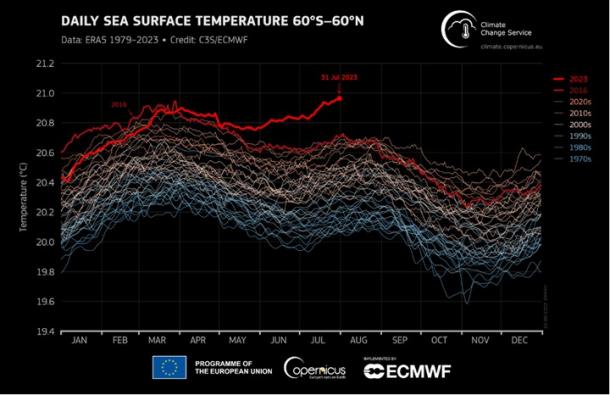
5 Steps to Build an Effective CSR Strategy
In today’s business landscape, Corporate Social Responsibility (CSR) has evolved from being a “nice-to-have” to ...

The global average temperature for July 2023 is confirmed to be the highest on record for any month. The month was 0.72°C warmer than the 1991-2020 average for July, and 0.33°C warmer than the previous warmest month, July 2019, according to monthly climate bulletin of the Copernicus Climate Change Service (C3S).
The C3S, implemented by the European Center for Medium-Range Weather Forecasts on behalf of the European Commission with funding from the EU, routinely publishes monthly climate bulletins reporting on the changes observed in global surface air temperature, sea ice cover and hydrological variables.
All the reported findings are based on computer-generated analyses using billions of measurements from satellites, ships, aircraft and weather stations around the world.
Samantha Burgess, Deputy Director of the Copernicus Climate Change Service (C3S), said “We just witnessed global air temperatures and global ocean surface temperatures set new all-time records in July. These records have dire consequences for both people and the planet exposed to ever more frequent and intense extreme events.”
“2023 is currently the third warmest year to date at 0.43ºC above the recent average, with the average global temperature in July at 1.5°C above preindustrial levels. Even if this is only temporary, it shows the urgency for ambitious efforts to reduce global greenhouse gas emissions, which are the main driver behind these records.”
“News of the warmest month on record perhaps shouldn’t come as a surprise, said Chris Hewitt, Director of Climate Services at the World Meteorological Organization, during UN media briefing on 8 August. WMO’s latest annual State of the Climate Report stated that 2015 to 2022 were the eight warmest years on record, and this is on the back of a clear warming decade-on-decade. As we continue to see continued increases in concentrations of greenhouse gases in the atmosphere, this long-term warming will continue and temperature records will continue to be broken.”
Comparing averages for the calendar year to date, from January to July, the global mean for 2023 is the third highest on record, at 0.43°C relative to 1991-2020, compared with 0.49°C for 2016 and 0.48°C for 2020. The gap between 2023 and 2016 is expected to narrow in the coming months, as the latter months of 2016 were relatively cool (reducing the annual average to 0.44°C), while the remainder of 2023 is expected to be relatively warm as the current El Niño event develops.
اترك تعليقا